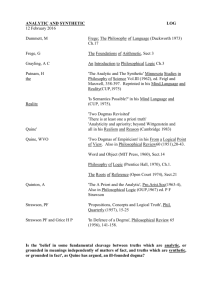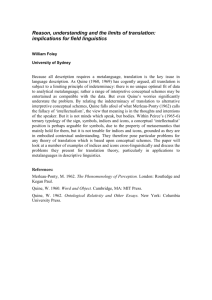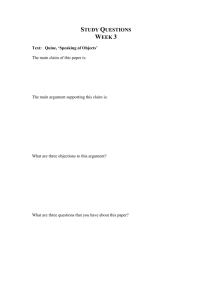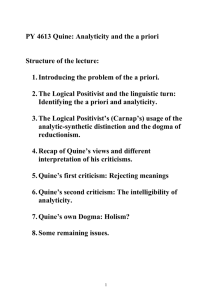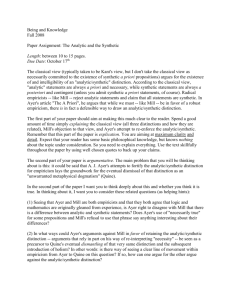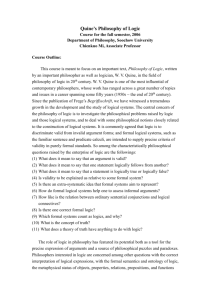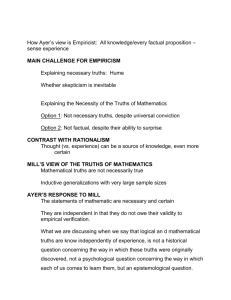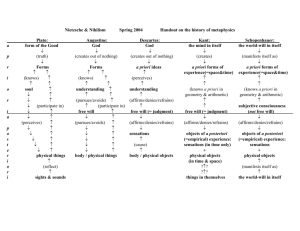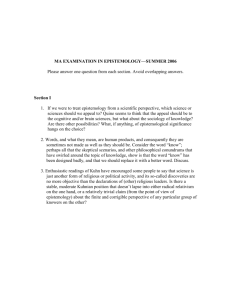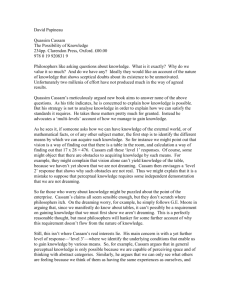Analytic-Synthetic Distinction: Quine's Critique & Responses
advertisement
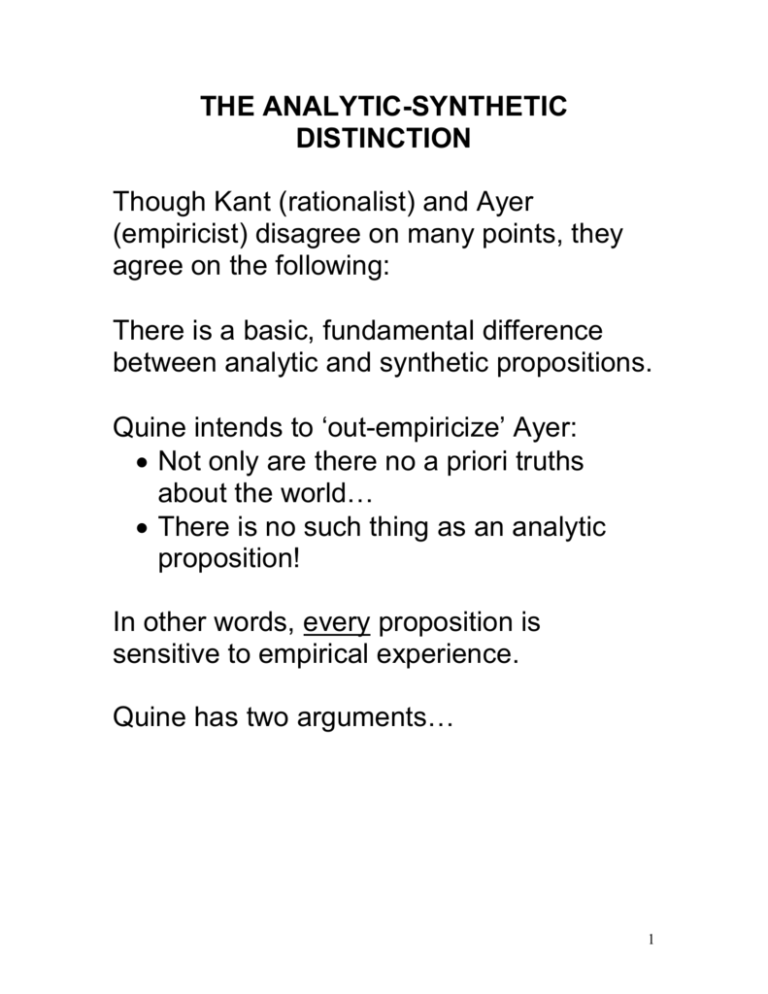
THE ANALYTIC-SYNTHETIC DISTINCTION Though Kant (rationalist) and Ayer (empiricist) disagree on many points, they agree on the following: There is a basic, fundamental difference between analytic and synthetic propositions. Quine intends to ‘out-empiricize’ Ayer: Not only are there no a priori truths about the world… There is no such thing as an analytic proposition! In other words, every proposition is sensitive to empirical experience. Quine has two arguments… 1 Argument I: Circularity Quine identifies two types of analytic claim: I. Logically true: P=P No unmarried man is married The truth of these depends only on the logical terms (‘not’, ‘=’). They are true no matter how we re-interpret the other words. II. The rest: Plato is the teacher of Aristotle No bachelor is married These can be transformed into type I by replacing words with their synonyms. 2 Synonymy Quine: So, a full understanding of ‘analyticity’ rests on the notion of ‘synonymy’. But is the latter any clearer than the former? Suggestion: Yes. A is synonymous with B if one is defined as the other. Quine: how do we know that A is defined as B? Check a dictionary? This just tells us that lexicographers believe that A and B are considered synonymous. Circular! 3 Truth by definition Okay, how about the following: A and B are synonymous if A = B is true by definition. Quine: we introduce definitions to do three things: 1. accurately paraphrase a notion we already have 2. Improve on a concept while preserving old usage 3. Create a new meaning However, paraphrase is good only if it preserves meaning—i.e. is synonymous. New usage is good only if it is synonymous in old contexts. Hence, only #3 does not rely on a prior notion of synonymy, but it is insufficient for a full notion of ‘analyticity’. 4 Interchangeability Perhaps A is synonymous with B if and only if ‘A’ and ‘B’ can be interchanged without changing the truth value of a sentence. Quine: then ‘bachelor’ is not synonymous with ‘unmarried man’: ‘“Bachelor” has seven letters’ = true ‘“Unmarried man” has seven letters = false. Reply: okay, but they can be interchanged when it is their meanings that are under consideration. Quine: In other words, interchangeability works when their meanings are the same. But ‘same meaning’ = ‘synonymous’ So we still haven’t escaped the circle. 5 Necessity How about this: ‘All and only bachelors are unmarried men’ is analytic = necessarily, all and only bachelors are unmarried men. Quine: to say that a sentence is necessarily true is just to say that it is analytic. I.e., Necessarily, P will be true when and only when ‘P’ is analytic. In sum: all attempts to define ‘analytic’ are circular or rest on terms that are no clearer than ‘analytic’. So, the analytic-synthetic distinction has never been properly defined. Quine also has a second argument that would rule out even logical truths as analytic… 6 Argument II: Holism and indeterminacy Quine: To test any claim, a whole series of background beliefs must be accepted. E.g.: I want to see if M1 and M2 fall at the same rate. I drop each at the same time and observe when they land. I assume: Mass stays constant during test. Force of gravity is the same on each. Space-time doesn’t “warp” for one. My clock works properly. My eyes function properly. Etc. If M1 and M2 don’t land at the same time, any one of these beliefs might be false. I can’t pick out which one just on the basis of that observation. 7 What this tells us Quine: Experiment can only tell us that a system of beliefs has an error in it somewhere. We may choose to give up or hold on to any belief so long as we are willing to change others. No experiment can determine once and for all how to adjust the system! So: No statement or belief has individual meaning: only entire theories are testable against experience. How does this impact the analytic-synthetic distinction? 8 Revision knows no bounds Quine: Given a surprising or recalcitrant experience, you may revise your system of beliefs as you see fit (so long as you preserve observational claims). If, for example, it turns that the simplest way to respond to an observation is to revise classical logic, you are entitled to do so. Since entire systems are tested, not individual claims, no individual claim can be said to be non-revisable in principle. 9 The web of beliefs Beliefs form an interconnected web: Statements about observations are at the periphery. Others are more central. Logic and math are near the middle. But…since all claims are interconnected, changes in one area can impact changes anywhere else. Though we may hold on to logical beliefs very tightly—they are in the middle—there is no reason they can’t be changed to preserve other areas of the web. 10 Conclusion Quine: Any revision that is useful for predicting or explaining experience is acceptable. We can’t give logical laws a privileged, a priori status—any part of the web of belief is revisable! Conclusion: there are no analytic truths; no truths are necessary or empirically untouchable. 11 A rationalist response Chisholm disagrees with Ayer and Quine. Ayer: All a priori truths are rules about how to use language. Chisholm: This means that, e.g., ‘no square is round’ is true only because it is a rule that it is true. But the following is obvious: (T) ‘P’ is true if and only if P So, ‘No square is round’ is true if and only if no square is round. I.e. a certain relation between properties must exist for the claim to be true. Second argument: ‘No square is round’ does not refer to words so it can’t be rule about their usage! 12 Against Quine Quine: there is no way to tell from observing linguistic behaviour whether it is necessary that if ‘P’ applies to x, so does ‘Q’. Chisholm’s response: even if we can’t empirically observe synonymy, it doesn’t follow that there are no analytic truths. Quine needs a principle such as: In order for there to be analytic truths, we must be able to determine synonymy observationally. But how could Quine defend this? It can’t be observed. It’s not true by definition (which Quine rejects at any rate). It appears to be a synthetic a priori claim. 13 The upshot of this Chisholm: The traditional empiricist account of a priori knowledge is implausible. So is Quine’s denial of a priori truth. So, we should reject empiricism and defend the analytic/synthetic distinction and the possibility of a priori knowledge. 14 Reviving the a priori Chisholm: certain relations hold necessarily: Red includes coloured Square excludes round Could we learn these by observation (induction)? Chisholm thinks not: 1. There are no actual squares. 2. Induction presupposes a priori truths. Defence of #2: Say we observe the world and find no red things that are non-coloured. We want to conclude ‘red includes coloured’ or ‘all red things are coloured’. We must first know that ‘any observation of a non-coloured red thing contradicts “all red things are coloured”’. I.e., we need deductive logic to perform induction, so at least some claims are knowable a priori 15 Axioms Okay, if knowledge requires a priori truths, what is the nature of such propositions? Chisholm: A priori truth = once you accept it, you see it is true. Note: You must really accept it; you must reflect on it and understand what it says. It must be certain, i.e. there is nothing more reasonable to accept than it. Chisholm calls these ‘axioms’. Also: suppose that: E is known a priori If E then H is known a priori. Then, if you understand H, it is also known a priori. Thus, a priori reasoning can expand your knowledge. 16 In sum Some claims are such that if you understand them, you see they are true. They can’t be known by observation. Empiricist accounts of how they could be known independently of observation are implausible. So, either some propositions are known a priori, or else we must remain sceptical. But it is absurd to remain sceptical about: No square is round. All bachelors are unmarried. Etc. Chisholm: so, a priori knowledge is possible. 17 Analyticity revived Chisholm: “All S is P” is analytic = 1. Either S is the same as P, or 2. S is a conjunction of logically independent terms, one of which is P. P and Q are logically independent = Neither P nor not-P entails Q or not-Q. Neither Q nor not-Q entails P or not-P. #2 tells us what it is for a predicate to be contained in a subject. E.g.: ‘all fathers are parents’ is analytic because ‘Father’ = ‘male parent’. ‘Male’ does not entail ‘parent’ and vice versa. 18 Why logical independence? Consider: ‘All fathers are parents’. Here the predicate, ‘parent’ has truly been ‘analyzed out’ of the subject because ‘father’ = ‘male and parent’. But now consider: ‘Everything that is a father and a parent is a parent’. Has ‘parent’ really been analyzed out of the subject? Chisholm: No. The second ‘parent’ in the subject is redundant. It is already logically implied by ‘father’. So, we haven’t really analyzed ‘father’. Genuine analysis involves breaking down a concept into its ‘atoms’, its most basic parts. 19 Synthetic a priori propositions Are all a priori claims analytic (e.g. Ayer)? Chisholm: consider ‘All squares have shape’. This is a priori. If it is analytic, then ‘square’ can be reduced to logically independent concepts, one of which is ‘has shape’, i.e.: ‘Everything that is ____ and has shape has shape’. We need to fill the blank with something that preserves the original meaning and is logically independent of ‘has shape’. Can this be done? Chisholm: no. 20 Some attempts I. ‘Everything that is square and has shape has shape’. I.e., ‘Square’ = ‘square and has shape’. Problem: ‘Square’ entails ‘has shape’, so they are not logically independent. II. ‘Everything that is (i) either square or without shape and (ii) has shape, has shape. Problem: these are not logically independent. I.e., not-(ii) entails (i). If ‘has shape is false’ then ‘without shape or square’ is true. Chisholm: try others—there is little hope here. 21 Upshot 1. It is implausible to deny that we know that ‘All squares have shape’. 2. This claim can’t be confirmed observationally. 3. This claim is not analytic. Therefore, 4. Synthetic a priori knowledge is possible. 22 Metaphysics The picture of metaphysics that emerges from Chisholm: 1. Metaphysics involves reflection on concepts such as ‘person’, ‘object’, ‘time’, ‘cause’, ‘substance’, etc. 2. Some claims involving these concepts are such that if you understand them, you see they are true. 3. Thus, a priori, metaphysical knowledge is possible. 4. Logic is knowable a priori. 5. We can use logic to build on and extend the knowledge gained in #2. 23 A sceptical objection Objection: Suppose you reflect on a proposition and become certain it is true. How do you know that this kind of experience guarantees truth? Surely you need to know a general principle, such as: ‘Any proposition whose contemplation gives rise to a feeling of certainty must be true’. But people have made mistakes about what they were certain about. So no such principle is sensible. Chisholm: If all knowledge requires application of principles, then principles are only known if there is a principle to justify them. This leads to a regress. Knowledge can’t get off the ground unless some of it is a priori and foundational. 24 Summary Quine There are no necessary truths There is no analyticsynthetic distinction All claims are empirically revisable There is nothing for metaphysical speculation to accomplish other than pragmatic ends Chisholm All a priori knowledge is of necessary truths Not all necessary truths are analytic There is synthetic a priori knowledge Metaphysics is possible and can give rise to knowledge 25
